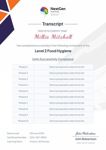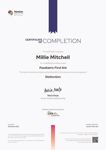
News Writing, Production and Reporting
Accredited By CPD | High-quality Materials | Video Lessons | Lifetime Access | 24/7 Tutor Support
NextGen Learning
Summary
- Exam(s) / assessment(s) is included in price
- Tutor is available to students
Add to basket or enquire
Overview
Journalists are responsible for collecting and disseminating information to the public through various media channels such as newspapers, television, radio, and online platforms. They are expected to have an in-depth understanding of the principles, laws, and ethics of journalism to maintain the integrity and credibility of their work.
Learning outcomes:
- Understand the fundamental principles and history of journalism
- Learn effective interviewing techniques to gather information
- Develop skills in news writing, production, and reporting for different media
- Understand the regulatory bodies that govern media and journalism
- Learn about journalism ethics, defamation, and laws that impact journalism
- Develop niche journalism skills and techniques to write good feature stories
- Acquire knowledge and skills for online and freelance journalism
CPD
Course media
Description
This Journalism course provides a comprehensive theoretical foundation for individuals who aspire to become journalists. The course covers essential topics such as principles and history of journalism, interviewing, news writing and reporting, television and radio journalism, media regulatory bodies, journalism ethics, and niche journalism. Participants will gain insights into the writing skills required for journalists and how to write good feature stories.
Certification
Upon completion of the course, learners can obtain a certificate as proof of their achievement. You can receive a £4.99 PDF Certificate sent via email, a £9.99 Printed Hardcopy Certificate for delivery in the UK, or a £19.99 Printed Hardcopy Certificate for international delivery. Each option depends on individual preferences and locations.
Who is this course for?
This course is ideal for individuals who want to develop an understanding of the theoretical aspects of journalism. It is suitable for those who are interested in pursuing a career in journalism or for those who want to improve their existing knowledge and skills in the field.
At the end of this course, participants will have the knowledge and skills required to pursue a career in journalism, such as a reporter, correspondent, editor, or freelance journalist.
Career path
- Journalist: £18,000 - £40,000 per year
- News Reporter: £18,000 - £30,000 per year
- Broadcast Journalist: £20,000 - £35,000 per year
- Editor: £20,000 - £50,000 per year
- Feature Writer: £20,000 - £45,000 per year
- Freelance Journalist: £50 - £500 per article
Questions and answers
Currently there are no Q&As for this course. Be the first to ask a question.
Reviews
Currently there are no reviews for this course. Be the first to leave a review.
Legal information
This course is advertised on reed.co.uk by the Course Provider, whose terms and conditions apply. Purchases are made directly from the Course Provider, and as such, content and materials are supplied by the Course Provider directly. Reed is acting as agent and not reseller in relation to this course. Reed's only responsibility is to facilitate your payment for the course. It is your responsibility to review and agree to the Course Provider's terms and conditions and satisfy yourself as to the suitability of the course you intend to purchase. Reed will not have any responsibility for the content of the course and/or associated materials.





